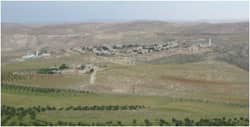Whether you call them pragmatic or deem them racist, the guidelines of that formula are simple. For years Lieberman has been preaching that the real threat to the future of Israel comes not from the Palestinians beyond the Green Line but from the million plus within the state of Israel who are full Israeli citizens. As he once put it, "If we want to stop the conflict, we must separate the two peoples. The main problem is the Israeli Arabs. I think separation has to include them. I am talking about a land swap as well as a population swap. This seems brutal and sounds brutal, but there is no other solution."
Two years ago, with the help of like-minded colleagues, he designed a plan called "exchange of territory and population." In practical terms, this means redefining the borders of Israel in a way that regions heavily populated by Israeli Arabs would be annexed to a future Palestinian state. In exchange, Israel would get to keep clusters of settlements, and the so-called "demographic threat" posed by Israeli Arabs would be diminished. Israeli Arabs who no longer live within Israel would have their Israeli citizenship revoked. Those who remain would be asked to pledge an oath of loyalty and perform military or alternative national service (from which they are currently exempted) in order to keep their citizenship. The proposal has drawn international condemnation, but only one Israeli cabinet minister -- Labor's Ophir Paz-Pines -- stepped down to protest Lieberman's appointment. All the others found pretexts to stick to their chairs.
Paz-Pines argues that Lieberman's "racist declarations harm the democratic nature of Israel." But whenever he is accused of being racist, which is often, Lieberman falls back on historical precedents to support his case. His favorite one is Cyprus, divided into Turkish and Greek sections after the 1974 war for the island's control, forcing 160,000 people to flee to "their" side. To show his commitment to his plan, Lieberman says that if necessary, he'd be willing to evacuate his home in the West Bank settlement of Hanokdim.
 Lieberman's uncompromising approach may have something to do with his upbringing as an only child in an adamantly Jewish family in Kishinev, Moldova, then part of the U.S.S.R. "We all spoke Yiddish and breathed Israel," he says. "My parents challenged everybody when they chose to speak Yiddish loudly, even on a crowded bus. It was a conscious manifestation of power. I spoke only Yiddish until the age of three. When I had to go to the hospital as an infant, I yelled ‘milch,' asking for milk. Nobody understood me."
Lieberman's uncompromising approach may have something to do with his upbringing as an only child in an adamantly Jewish family in Kishinev, Moldova, then part of the U.S.S.R. "We all spoke Yiddish and breathed Israel," he says. "My parents challenged everybody when they chose to speak Yiddish loudly, even on a crowded bus. It was a conscious manifestation of power. I spoke only Yiddish until the age of three. When I had to go to the hospital as an infant, I yelled ‘milch,' asking for milk. Nobody understood me."
He came of age in the '70s, when "Jews were 25 percent of the population of Kishinev," he continues. "We never tried to hide. Just the opposite. We were more affluent, better educated, and we showed it." Provocation was for him a way of life. It still is. "Karl Marx said that every individual is the product of society. Probably, I am, too," Lieberman says. "The Jews of Moldova have this no-nonsense streak. They are ‘doers,' not idle philosophers. No wonder Meir Dizengoff, another Jew from Moldova, established Tel Aviv."
In 1978, when he was 20, his family made aliyah. Having won first prize for a play he wrote as a student in Moldova titled Students, he dreamed of a literary career. But his debut on the public stage in Israel came as an activist in a radical right-wing students' movement at Hebrew University of Jerusalem, where he studied international relations. Later, he served in the army and had a short, unhappy experience at an ulpan on a kibbutz. "I soon realized I hate this kolkhoz," he says, using the Russian term for the hated Soviet collective farm. This seems like a strange statement coming from an urbane Soviet immigrant who has chosen to make his home in a small settlement in the Judean desert, and I ask about the discrepancy. "That's different," he explains. "Unlike the kibbutz, the settlement is organized individualism."
Lieberman certainly doesn't fit the stereotype of your typical settler in biblical sandals. Few settlers drive home in a black Mercedes SUV, wear stylish suits, smoke fine cigars, and drink expensive wines. Lieberman does all of the above and has never been accepted as one of its own by the settler movement in spite of his ardent support for their cause. The Liebermans are also not your typical Soviet immigrants, most of whom avoid the settlements, preferring cities, and aren't religious. While Lieberman, like his two sons, is secular, his wife Ella, also from Moldova, and their daughter Michal have become Orthodox.
When I first interviewed Lieberman for Ha'aretz in 1996, our readers were surprised to discover that he genuinely adores literature and theater. Even now as we talk, he quotes French writers and philosophers such as Prosper Mérimée, whose novella Carmen was famously staged as an opera by Georges Bizet. Lieberman deliberately lets it slip that Hollywood is reviewing a script he recently wrote but refuses to disclose any details.




